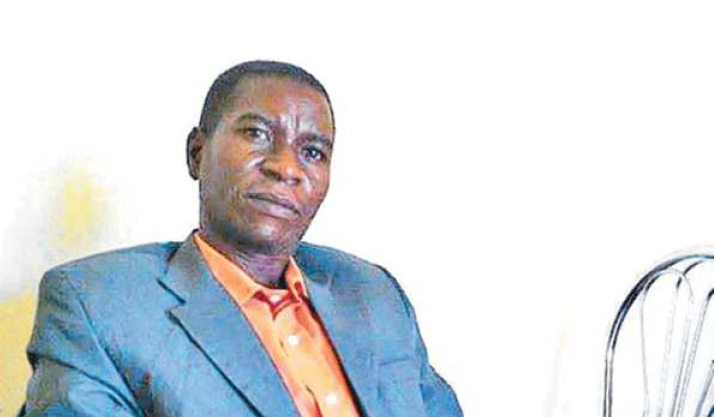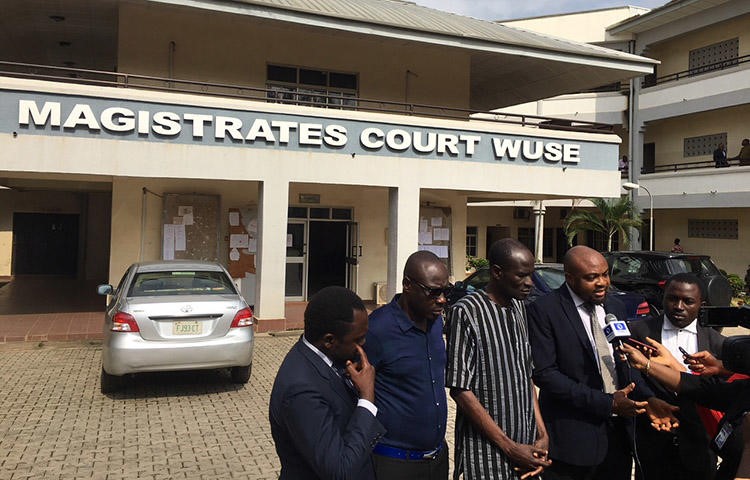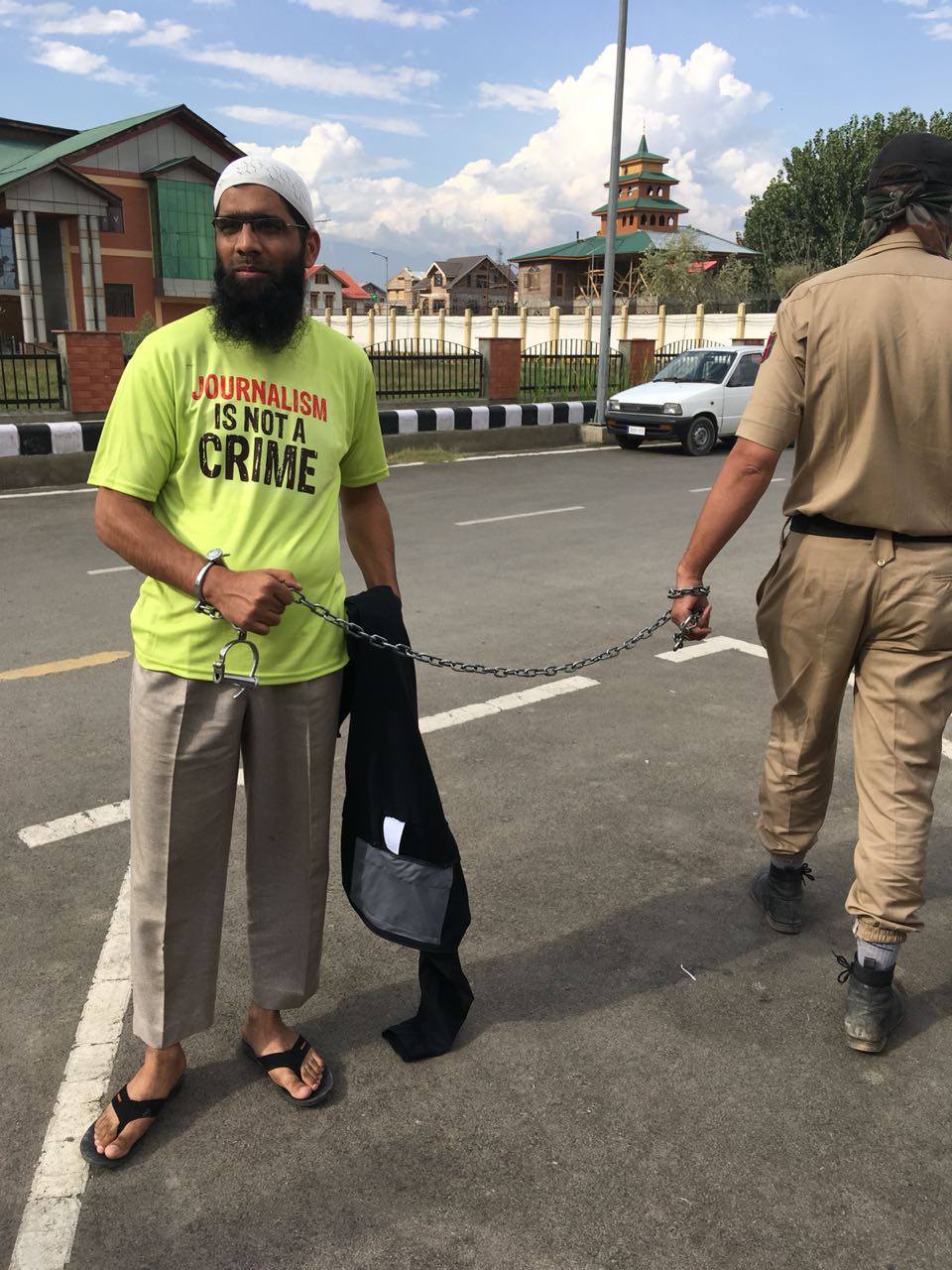Journalists imprisoned for their work in countries from India to Turkey to Kyrgyzstan are included on this month’s list of cases representing the most serious threats to global press freedom.
The list — updated monthly by the One Free Press Coalition, which was created by a dozen news organizations, including TIME, with the goal of defending journalists under attack — identifies the 10 most urgent cases threatening press freedom around the world.
In December, TIME named The Guardians the 2018 Person of the Year, recognizing four journalists and one news organization for their work in the face of a “war on truth.” One of those journalists, Jamal Khashoggi, remains atop the latest 10 Most Urgent list, on the heels of a United Nations special report that found “credible evidence” warranting a deeper investigation into the role of Saudi Crown Prince Mohammed bin Salman in Khashoggi’s killing on Oct. 2, 2018. The report described Khashoggi’s death as a “deliberate, premeditated execution.”
The Trump Administration continues to face criticism for maintaining a close relationship with Saudi Arabia despite conclusions by U.S. intelligence officials that bin Salman ordered Khashoggi’s death. Last week, President Donald Trump vetoed bipartisan resolutions that would have blocked billions of dollars in arms sales to Saudi Arabia and the United Arab Emirates.
Read about the 10 journalists on the August list here:
1. Jamal Khashoggi (Saudi Arabia): Stonewalling continues after new UN report implicates Saudi prince for journalist’s murder.
Months after his brazen killing, and despite findings from the UN and the CIA that point to the Saudi crown prince’s involvement, there has been no independent criminal investigation. Calls for the White House to release intelligence reports have gone unheeded, along with a deadline to reply to Congress as required under the U.S. Global Magnitsky Act.
2. Azory Gwanda (Tanzania): Tanzanian official claims missing journalist is dead—then backtracks.
Azory Gwanda, a freelance journalist investigating mysterious killings in rural Tanzania, has been missing since November 21, 2017, and the government has failed to conduct an investigation or disclose what it knows. On July 10, Tanzanian Foreign Minister Palamagamba Kabudi said in an interview that Gwanda had “disappeared and died,” but backtracked amid requests for clarification.

3. Juan Pardinas (Mexico): Mexican newspaper editor targeted with death threats for criticizing new president.
Mexican media organizations and journalists have recently reported a sharp increase in threats and online harassment over critical reporting of the López Obrador administration. Juan Pardinas, the editor-in-chief of Mexican newspaper Reforma, received a barrage of online harassment and threats after President Andrés Manuel López Obrador criticized the newspaper in April. López Obrador acknowledged the threats against Pardinas and said that his government had offered protective measures to the journalist.
4. Paul Chouta (Cameroon): Journalist in maximum security prison blocked from seeing family.
Cameroon Web reporter Paul Chouta was arrested in May, denied bail, and charged with defamation and spreading false news. Chouta’s editor said he suspects the case was in retaliation for critical reporting. His case has been delayed until August 13 and he remains in a maximum-security prison.
5. Azimjon Askarov (Kyrgyzstan): Kyrgyz court upholds life sentence for documenting human rights abuses.
Award-winning journalist Azimjon Askarov, who is an ethnic Uzbek, has spent nine years in prison on trumped-up charges for his reporting on human rights violations. Despite persistent international condemnation and calls for his release, a Kyrgyz court that had reviewed his case in light of new legislation ruled to uphold his life sentence on July 30.
6. Ayşe Nazlı Ilıcak (Turkey): Turkish journalist faces 30 years in solitary confinement.
Ayşe Nazlı Ilıcak, a commentator for opposition newspaper Özgür Düşünce and Can Erzincan TV, was arrested in 2016 and sentenced in February 2018 to life without parole for trying to overturn the constitution through her journalism. In a separate trial in January, she was sentenced to an additional five years for revealing state secrets. In Turkey, which has been the top jailer of journalists three years in a row, life sentences without parole equate to 30 years in solitary confinement, with limited visits.
7. Marzieh Amiri (Iran): Imprisoned journalist denied healthcare after covering May Day demonstrations.
Iranian authorities arrested Marzieh Amiri, an economics reporter at Tehran-based newspaper Shargh Daily, as she covered May Day demonstrations, and her family has had limited contact with her since. Authorities have accused Amiri of committing crimes against national security without giving further details.
8. Jones Abiri (Nigeria): Journalist re-arrested on terrorism and cybercrime charges.
Jones Abiri, the publisher and editor-in-chief of the Weekly Source, is behind bars on charges under Nigeria’s cybercrimes act, anti-sabotage act, and terrorism prevention act for crimes allegedly carried out in 2016. The charges are the same ones that a court threw out after he was held without access to his family or a lawyer from 2016 to 2018.

9. Aasif Sultan (India): Journalist imprisoned one year without due process for covering conflict.
Aasif Sultan, a reporter for Kashmir Narrator, will have been imprisoned one year on August 27, arrested in 2018 and months later charged with “complicity” in “harboring known terrorists.” He has been repeatedly interrogated and asked to reveal his sources by police. Sultan continues to be denied due process, with ongoing delays in his hearings.

10. Truong Duy Nhat (Vietnam): Blogger who disappeared in Thailand imprisoned in Vietnam.
Truong Duy Nhat, a Vietnamese reporter with Radio Free Asia, went missing in January in Bangkok, Thailand, where he had applied for refugee status. In March, his daughter learned he was jailed without charge in a Hanoi detention center. Nhat was previously sentenced to two years in prison in 2013 in connection to his critical reporting on the government.
More Must-Reads from TIME
- L.A. Fires Show Reality of 1.5°C of Warming
- Home Losses From L.A. Fires Hasten ‘An Uninsurable Future’
- The Women Refusing to Participate in Trump’s Economy
- Bad Bunny On Heartbreak and New Album
- How to Dress Warmly for Cold Weather
- We’re Lucky to Have Been Alive in the Age of David Lynch
- The Motivational Trick That Makes You Exercise Harder
- Column: No One Won The War in Gaza
Contact us at letters@time.com